Baltimore Pride: Highlighting Our LGBTQ+ Collections
By Vivien Barnett, Curatorial & Collections Assistant, and Sandra Glascock, Special Collections Archivist
Post published June 22, 2022
On Saturday, June 25, 2022, many Marylanders will gather on North Charles Street to view the Baltimore Pride Parade: a joyous event where members of the LGBTQ+ community can celebrate who they are. This will be the first time that Baltimore Pride has taken place since 2019, and you can read more about the series of events that will be taking place throughout the city here.
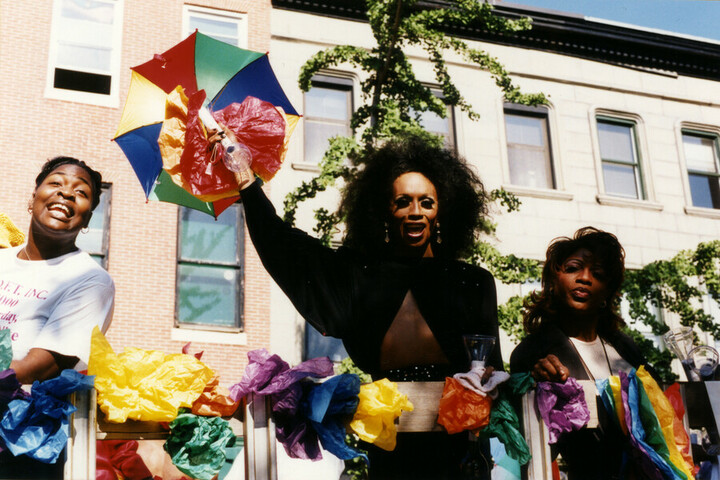
June is celebrated nationwide as Pride Month in recognition of the 1969 Stonewall uprising in New York City, which was a series of protests by members of the LGBTQ+ community against police raids and harassment that was monumental in advancing the gay liberation movement. Today, parades, parties, and other celebrations occur in cities across the country throughout the month of June to honor those who fought for the right to love who they love, and to be who they are. To celebrate this year’s Pride Month, we want to showcase some of the LGBTQ+ materials found within the Maryland Center for History and Culture’s Museum and Library collections.
For decades, only a few blocks away from the MCHC campus, people would gather to drink, flirt, and dance the night away at Club Hippo. In addition to being a nightlife hotspot, Club Hippo was a safe haven for members of Baltimore’s LGBTQ+ community, as its motto for 40 years was “Where Everyone is Welcome.” The Hippo closed its doors in 2015 and the building has since been repurposed into a CVS Pharmacy, but the spirit of the club’s mascot, the pink hippo, lives on in the hearts of many who frequented the establishment. The iconic Hippo sign will be on display in Discover Maryland until this fall; come take your picture in front of the sign and share your memories of the club before it comes down!
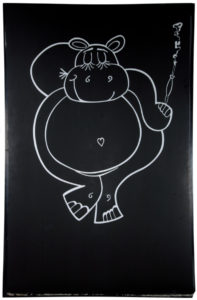
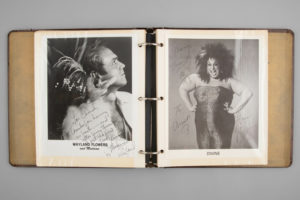
The library has a collection of photographs and ephemera donated by the club’s owner, Charles L. “Chuck” Bowers, and DJ Farrell Maddox. One of the highlights is a scrapbook containing autographed headshots from performers who appeared at the Hippo, including one from drag icon and Baltimore- native, Divine. Born Harris Glenn Milstead (1945-1988), the actor and recording artist began performing in friend and fellow Baltimorean John Waters’ underground movies during the 1960s. The 1988 film “Hairspray” marked Divine’s breakthrough into mainstream cinema, but he unfortunately passed away only a month after the Baltimore premiere. Upon his death, People magazine named him the “Drag Queen of the Century,” and his impact on pop culture continues to be felt well into the 21st century.
Devin Cherubini originally came to Baltimore to study at the Maryland Institute College of Art (MICA), but eventually found a home at Club Hippo; he would often complete his homework at the bar before the crowds poured in. Devin was also one of the first drag kings to perform in Baltimore in the early 1990s. Dressing up in costumes and dancing to the music of David Bowie and Nine Inch Nails, he views his drag as an art form. This 1970s themed outfit was just one of many costumes that he wore while performing under the name Devin Hellfire. He was also a member of the band Transexual Fetus, which consisted entirely of transgender musicians that performed in Baltimore.
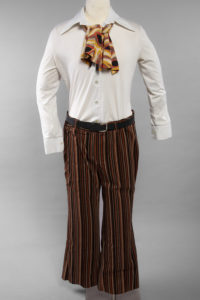
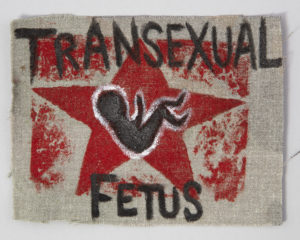
Derrick Smith is another Baltimore drag performer who uses clothing and accessories to craft his drag persona, Mother Helena, the Queen of Gospel. Drag queens often sew and embellish their own garments, but wigs and shoes like these size 10 heels are bought at stores to complete the look. Today, Baltimore is host to many drag events, including brunches, dinner shows, and other performances.
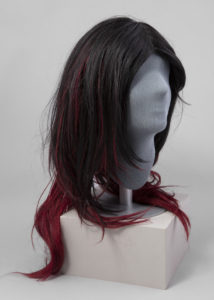
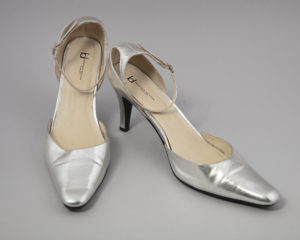
Merrick Moses transitioned from female to male during 2014-2017, and he donated objects to the museum to represent his story. The wearing of chest binders to minimize the appearance of breasts is a common gender-affirming practice for trans individuals, while taking testosterone is a part of the medical transition. About this donation, Merrick said, “The chest binder was my first binder. I bought it for myself for my 40th birthday. I finally got the courage to bind after being so dysmorphic from 2011-2014. When I put it on for the first time, I felt I had a new lease on life. Finally, my body was beginning to look like how I felt inside, masculine.”
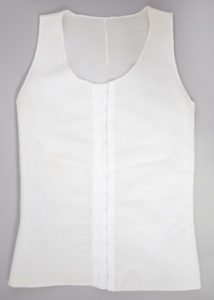
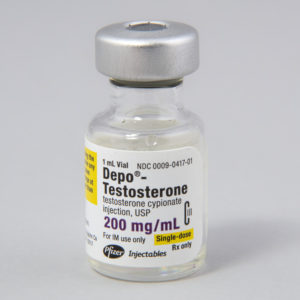
Stories involving the fight for civil rights for members of the LGBTQ+ community are also represented in the MCHC collections. Mark Procopio has dedicated his life to attaining equality, access, and opportunity for all people regardless of race, gender identity, and sexual orientation. He served as the Executive Director of FreeState Justice, a statewide LGBTQ+ civil rights advocacy and legal aid nonprofit in Maryland. The Mark Procopio Collection consists of newspaper clippings, documents, brochures, pamphlets, bumper stickers, and audiovisual material related to various LGBTQ+ activist organizations in Maryland. These items were used by advocacy groups such as Equality Maryland and FreeState Legal to spread awareness and information on civil rights issues facing the LGBTQ+ community, especially in regards to marriage equality.
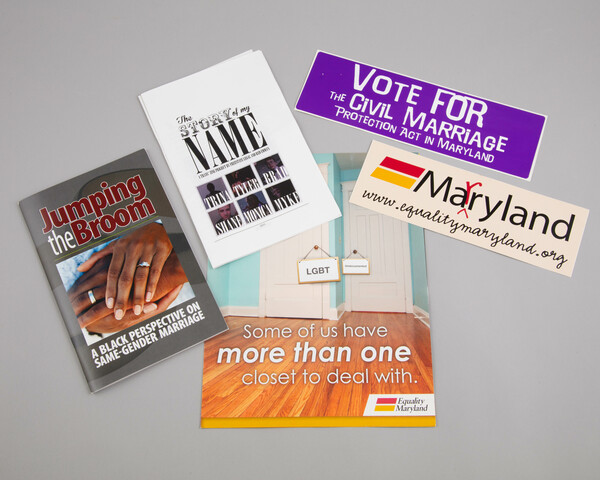
In 2012, Equality Maryland was part of the coalition that passed the Civil Marriage Protection Act allowing same-sex couples to marry, making Maryland the first state south of the Mason-Dixon line to legalize same-sex marriage. Upon learning of the passing of the Civil Marriage Protection Act and that it would take effect on New Year’s Day of 2013, Ryan Wilson and Shehan Welihindha decided to travel to Wilson’s home state in order to wed. They were living in Columbia, South Carolina at the time and could not legally marry there because in 2006, South Carolina voters approved a constitutional amendment banning nuptials between same-sex couples. The Wilson-Welihindha Marriage Papers contains materials related to their wedding ceremony performed at Baltimore City Hall, which was one of the first same-sex marriages to take place in the State of Maryland on January 1, 2013. Included in the collection is the original City of Baltimore Certificate of Marriage for the couple as well as a Certificate of Recognition signed by Baltimore Mayor Stephanie Rawlings-Blake.
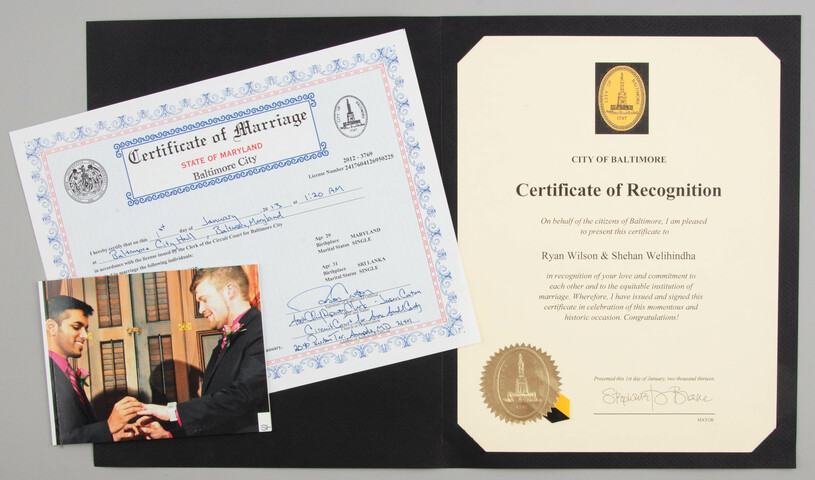
It is important to us that all Marylanders see themselves reflected at MCHC. In highlighting these objects and the stories behind them, we aim to amplify the voices of those who were previously unheard and excluded from the historical record. If you would like to donate objects that would help us to tell the story of Maryland’s LGBTQ+ community, please visit our “Item Donations” page on our website for more information on our donation process. For museum objects, please email our Museum team at museum_dept@mdhistory.org and for library donations, please email our Special Collections team at specialcollections@mdhistory.org.

